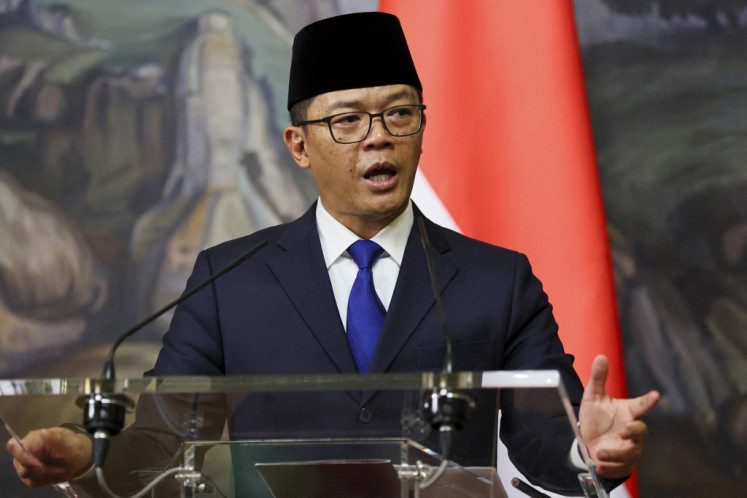Popular Reads
Top Results
Can't find what you're looking for?
View all search resultsPopular Reads
Top Results
Can't find what you're looking for?
View all search resultsNew biodiesel rule to cut fuel imports
A new regulation issued on Wednesday that requires a higher biodiesel use percentage is expected to cut the countryâs fuel imports by at least 100,000 barrels per day (bpd) for the rest of the year, a top official has said
Change text size
Gift Premium Articles
to Anyone

A
new regulation issued on Wednesday that requires a higher biodiesel use percentage is expected to cut the country's fuel imports by at least 100,000 barrels per day (bpd) for the rest of the year, a top official has said.
The Energy and Mineral Resources Ministry's director general for renewable energy and energy conservation, Rida Mulyana, said on Wednesday that the new ministerial regulation was expected to reduce the import of diesel fuel.
'[The import of diesel fuel] has partly contributed to the widening of the current account deficit and thus the new ministerial regulation on biodiesel, which was issued on Wednesday, is expected to help reduce it,' he said in a message sent to The Jakarta Post.
With the regulation, the government pushes down diesel fuel imports by raising the proportion of biodiesel in fuel from the current 2.5 percent to at least 10 percent, while also making the fuel-blending requirement mandatory.
The regulation aims to support the economic stimulus package announced last week to spur economic growth and stabilize the weakening rupiah.
The new ministerial rule would effectively replace the existing 2008 ministerial regulation on biofuel, which had mandated that all oil-based fuels must be mixed with biofuel.
According to data from the ministry, the realization of the 2008 ministerial regulation was still below expectations as biodiesel utilized in subsidized diesel fuel only accounted for 7.5 percent of the total, while bioethanol only covered 2 percent of total subsidized gasoline.
Indonesia currently imports around 35 million kiloliters of diesel oil per year, including 17.5 million kiloliters for subsidized diesel oil.
In total, Indonesia consumes around 1.3 million bpd of crude oil while it currently only produces around 850,000 bpd, with around 30 to 40 percent going to oil and gas contractors.
'With the new rule, the country will reduce its diesel fuel imports by around 100,000 barrels per day or around 15,800 kiloliters per day,' Rida said.
Deputy Energy and Mineral Resources Minister Susilo Siswoutomo said the government would also oblige state-owned oil and gas firm PT Pertamina to increase the fatty acid methyl ester (FAME) content in diesel fuel for the transportation sector.
The utilization of FAME, he said, was expected to increase by 10 percent from the current 2.5 percent.
'We will be able to lower diesel fuel imports by increasing the mandatory level of biodiesel use,' he said.
The national production capacity of FAME is currently 4.3 million kiloliter per year or equivalent to 80,000 barrel per day, according to ministry data.
This year, according to the data, the government expects the production of the FAME or biodiesel to increase by 46 percent to 2.65 million kiloliters from 1.81 million kiloliters last year.
Out of the 2.65 million kiloliters of FAME expected to be produced this year, 1.1 million kiloliters would go to the domestic market while the rest would be exported.
Last year, the country exported 1.14 million kiloliters of FAME.
Indonesia still relies on oil to meet 44 percent of its energy needs, while gas accounts for 23 percent, coal 27 percent and renewable energy 6 percent, according to a data from the National Energy Council (DEN).









